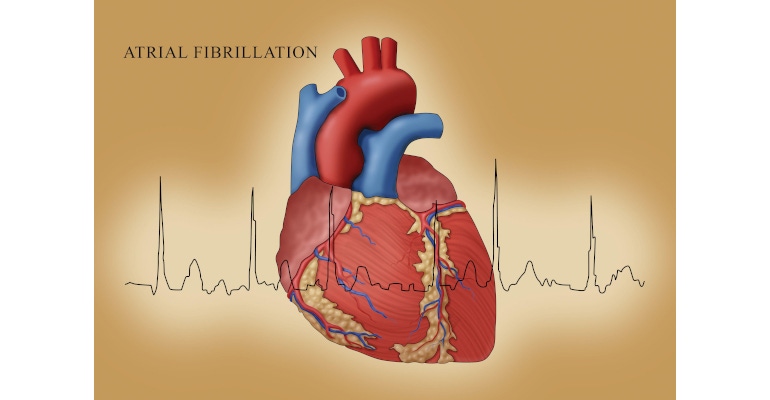New findings from the Feinstein Institutes for Medical Research could lead to better options to avoid arrythmias that can arise after cardiac surgery.
April 1, 2022

Bioeletronic medicine could hold the key in addressing atrial fibrillation (Afib) that occurs after cardiac surgery, according to study by researchers at the Institute of Bioelectronic Medicine at the Feinstein Institutes for Medical Research. A meta-analysis of more than 900 papers, which also encompassed seven clinical trials, has indicated that postoperative electronic stimulation of the vagus nerve could reduce the chance of developing the common arrythmia disorder. Stimulation of the vagus nerve postoperatively also reduced inflammation.
“We started [with] different approaches to modulate the autonomic nervous system,” said study lead author, Stefanos Zafeiropoulos, MD, Elmezzi Graduate School of Molecular Medicine scholar. “One of those that was found to be the most effective approach was vagus nerve stimulation. It has been found to reduce the incidence of postoperative atrial fibrillation and specifically after cardiac surgery, which was the target population.”
Bioelectronic Stim Reduces Inflammation, Duration of Afib
Autonomic neuromodulation therapy, in this case stimulation of the vagus nerve through two methods, was found to reduce the likelihood of developing Afib and in shortening its duration if it does develop. Neuromodulation was possible noninvasively with low-level stimulation techniques such as auricular or in conjunction with surgery with epicardial neural blockade. The latter would be placed during surgery, activated in ICU, and removed prior to discharge.
While postop Afib is short-lived, generally lasting only a few days after surgery before it spontaneously resolves, it can have serious implications, Zafeiropoulos explained. “Postop atrial fibrillation used to be considered benign,” he said. “Recently, they have found that although it is temporary most of the time—it is self-terminated and most of those people do not need to be on permanent anti-arrhythmic drugs or anti-coagulation drugs—it has been found that it is a prognostic factor, a predictor of, Afib in the future,” said Zafeiropoulos. Those who develop Afib post cardiac surgery are at highest risk of future development of Afib, which is associated with higher risk of stroke and other complications.
Afib Increases Risks and Costs
Even in the short term, developing Afib for a few days after cardiac surgery is likely to increase costs and length of stay. “Postop atrial fibrillation is common, it prolongs hospitalization, leads to higher costs and potential for complications,” said Zafeiropoulos. Developing Afib after cardiac surgery is relatively common, occurring in about 35% to 50% of patients within the first week, he said. The type of cardiac surgery is also linked to threat of development with valve surgery incurring the highest risk.
Currently, postop Afib is treated with beta blockers and steroids, with mixed data on their effectiveness, according to Zafeiropoulos. Bioelectronic medicine could offer another treatment avenue, potentially acting on two mechanisms of action.
Based on their paper, two MoAs are posited: “With the autonomic nervous system as a whole, it has been shown that sympathetic overactivation along with vagal activation precedes the postoperative Afib initiation,” said Zafeiropoulos. “The other is a potential anti-inflammatory mechanism and anti-inflammatory effect from the vagus nerve stimulation to reduce stress related to surgery.” It’s also possible that the two mechanisms work in tandem, and in combination with therapeutics, he said.
Future Direction of Research
Current medications also bolster the hypotheses: beta blockers act on sympathetic nervous system and steroids on inflammation.
Moving forward, the team at Feinstein plans to continue study on vagus nerve stimulation in arrythmias, with specific research in premature ventricular contractions. Additional collaboration with cardiac surgeons is planned.
The study was published in the Journal of the American College of Cardiology.
About the Author(s)
You May Also Like


